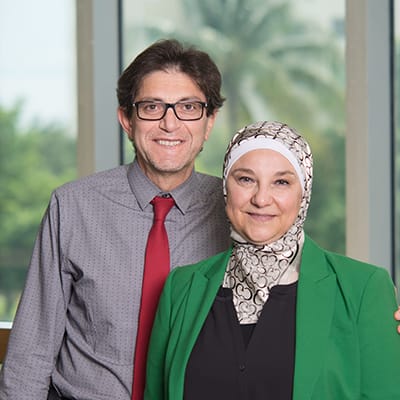Stories are important. They change people, enrich cultures, affect societies, and alter histories. How people relate to one another entirely depends on the social, geopolitical, cultural, and religious landscape of their experiences – and therefore, their stories relate the same messages. As a Black Afro-Arab American Muslim woman, I often feel I’m at the crossroads of many tense social avenues.
The various identities that I claim create an uncomfortable tension in almost every space I enter. Whether it be Black spaces, Arab, or Muslim spaces, I am aware of the social paradox I represent. And as a chemistry student on a pre-medical track, I’m usually the only Black Muslim in a class of 200. Through exchanges, volunteering in the South Florida Muslim community, and collaboration on campus to create more inclusive spaces, many people in my environment begin to understand and even appreciate the complexity that I bring to the mecca that is Miami.
Every opportunity that allows for diverse people to tell their own stories and share their cultures, societies, and histories must be accepted. My own personal story has been designated to me by mass media outlets that neither know of my Black nor Muslim experience, yet insist on being my “cultural” translator. There has never been a more perfect time to have a Center for Muslim World Studies.
The Center for Muslim World Studies will sponsor study abroad programs, internships in the U.S. and abroad, special events, community outreach activities, and a vibrant lecture series. One of its first goals will be to offer undergraduate and graduate certificates in Muslim World Studies, allowing FIU students to strengthen their formal degree training with a certificate in Islamic Studies.
Today, there exists no major platform for marginalized people in America. And in a time where Islam exists in every headline, it requires that the American people listen to what Muslims have to say and learn who they are as not only “Muslim,” but of the diverse cultures and inventions they bring as people. If the university’s role is to produce working citizens, then it must also produce well-rounded, socially educated ones.
Thank you!
Isra Ibrahim

Dr. Doured Daghistani and his wife, Sahar, believe in the future of FIU. Doured is president of the medical staff at Baptist Hospital, where he practices as a pediatric hematologist and oncologist. With assistance from his wife, he provides loving care to hundreds of children fighting cancer, and their supportive families. The couple is also passionately dedicated to helping those in their native Syria, as well as Syrian refugees seeking shelter in South Florida. With one of the initiatives first gifts, Doured and Sahar share the personal conviction that FIU’s commitment to establish the Center for Muslim World Studies should be a personal priority. As Dr. Daghistani states, "The Center for Muslim World Studies will empower FIU’s diversified students to realize the magnitude of Islamic civilization and to understand the non-stereotyped nature of Islam. Better tolerance is a key for global world peace."